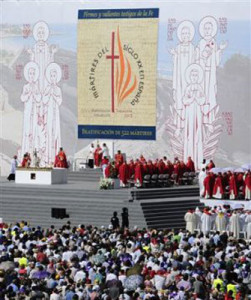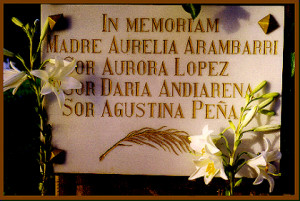 One of the amazing stories coming out of the beatification of the 522 martyrs of the Spanish Civil War on October 13 is the witness of Carmen Cubelle, age 76. Carmen’s aunt, Sr. Josefa Martinez, a Servant of Mary, was one of those beatified. Many family members of the martyrs attended the beatification but for Carmen, her aunt’s courage meant the difference between her own life and death.
One of the amazing stories coming out of the beatification of the 522 martyrs of the Spanish Civil War on October 13 is the witness of Carmen Cubelle, age 76. Carmen’s aunt, Sr. Josefa Martinez, a Servant of Mary, was one of those beatified. Many family members of the martyrs attended the beatification but for Carmen, her aunt’s courage meant the difference between her own life and death.
Carmen’s father had been arrested and killed for attending night Eucharistic adoration. Her mother, pregnant with Carmen, and her aunt, Sr. Josefa, were arrested a month later. In their jail cell, Sr. Josefa prayed aloud that her sister and her unborn child might be spared, and offered herself as an offering on their behalf.
“Lord,” she prayed, “if this jailer is a father and has a wife, move him to compassion, that he will set my sister free. May the life of her child be saved; may the life of my sister be saved, and may they kill me. I want to die a martyr for her, for the faith, defending the lives of my sister and my nephew.”
Sr. Josefa’s prayer was answered. The sisters bade farewell to each other, saying they would meet in eternity, and Sr. Josefa was taken before a firing squad and shot.
When I talked to a Servant of Mary about the beatification, the main theme that ran through all of the proceedings was a spirit of forgiveness. The martyrs all died, said Bishop Jaume Pujol Balcells of Tarragona, “in imitation of the Lord, with words of forgiveness on their lips.”
Carmen said that her mother was asked if she wanted to press charges against the men who had killed her husband and sister. Her mother said that “she didn’t want to know anything about it because she had forgiven them.”
